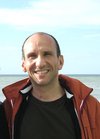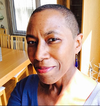2023 Fellows

AGNIESZKA TUSZYNSKA, PhD
Associate Professor of English, Queensborough Community College-City University of New York University
PROJECT TITLE: “A Damn Hard Fight”: The Life and Work of Willard Motley"
SUMMARY: Willard Motley (1909-1965) was one of the most visionary Black leftist writers and public intellectuals of the twentieth century whose literary and activist labor highlights questions that progressive writers, thinkers, and organizers still grapple with today. Based on archival research, my project brings Motley out of obscurity with the first-ever critical biography. My book will unearth the unjustly erased legacy of this influential twentieth-century Black author and visionary and it will point to various forms of policing of Black textuality and thought, linking this post-war writer’s work to issues that remain pressing today. My biography will reveal Motley’s unique amalgam of literary and political activities and his resistance to easy categorization, which have led to his erasure.

AMANDA JOYCE HALL, PhD
Postdoctoral Fellow, Department of African American Studies, Northwestern University
PROJECT TITLE: “A Child is Dying in Soweto:” Black Chicago and Freedom for South Africa"
SUMMARY: The city of Chicago was a critical stronghold for the U.S. anti-apartheid movement during last-quarter of the twentieth-century where traditions of African liberation, anti-colonialism, and Black internationalism lived on following the 1974 split of the African Liberation Support Committee. Black American support for the liberation of southern Africa continued as African exiles from the African National Congress, the Pan-Africanist Congress, the Black Consciousness Movement, and the South-West Africa People’s Organization worked alongside veterans of the 1960s Black Power struggles to fight for favorable domestic and international concessions from the United States and the Republic of South Africa.

ARIELE DIONNE-KROSNICK
PhD student, Architecture, McGill University, Montreal, Quebec, Canada
PROJECT TITLE: "The Fire Hydrants Were Turned on Again: Chicago, 1966"
SUMMARY: On July 12, 1966, on the West Side of Chicago, young Black people were playing in the gushing water from opened fire hydrants, having little to no access to public pools. When the police arrived on the scene, crowds gathered, and confrontations between civilians and police escalated over multiple days. Chicago was the focus of national media attention during the summer of 1966. Civil rights leaders and the local government negotiated a resolution involving the construction of twenty-four portable swimming pools. What are the specific spatial conditions that made public swimming pools in Chicago the site of key political struggle? How did Black civil rights protests in Chicago involving public swimming pools impact the symbolic and physical architecture of American cities? This project explores the architectural and urban histories of Chicago, the symbolic nature of the sites of protest, the spatial conditions that alternatively enabled or hindered protesters, describes the spatial occupation of the site of protest, and documents any resultant changes in the built environment.

ASIF WILSON, PhD
Assistant Professor of Curriculum & Instruction, University of Illinois Urbana-Champaign
PROJECT TITLE: "Right to the City: Black Organizing, the 1980s Education Summits, and a Model for participatory democracy"
SUMMARY: This project titled, Right to the city: Black organizing, the 1980s Education Summits, and a model for participatory democracy seeks to explore the 1987 and 1988 Education Summits that took place in Chicago, the impact they had on public education, and promise the processes used may hold for the future of public education. Through this archival study, which will utilize three BMRC-partner archival collections, I hope to document the processes and outcomes of the Education Summits as participatory components of democratic decision-making.

BRITNI MOORE PhD candidate, Linguistics, University of Illinois Urbana-Champaign
PROJECT TITLE: "Police Recruits and the Discursive Construction of ‘Real Rape’ in Sexual Assault Training"
SUMMARY: My dissertation examines the policies on, and discourses surrounding, rape in Illinois including how various women’s rights movements have pushed back against the racist and sexist ideas that have been used to dismiss rape. During 2nd and 3rd wave feminism, white feminists worked to shift the sexist cultural norms surrounding rape and established the expectation to report rape to the police. Black feminists were excluded from the official discourse but were active in the fight against rape, and supported policies that offer alternative paths to justice. By analyzing these discourses, I uncover the ways black feminist voices were silenced in Illinois’ fight against rape, and how their silencing continues to impact the application of rape policies today, especially within the legal system.

CALEB SMITH PhD candidate, History, Brandeis University
PROJECT TITLE: "Pillaging the Vanguard - The Neoliberal Shift of Black Politics in Chicago 1966 - 1994"
SUMMARY: The question as to where, how, and why neoliberalism came to affect Black politicians in the post-civil rights moment of the late 1960s holds answers to understanding American political history for years to follow. How do modern Black politicians that subscribe to neoliberalism differ from Black politicians of the New Deal and postwar era like Adam Clayton Powell and William Dawson? Pragmatic politics explains much of what is understood to impact Black political choices. After the Civil Rights Movement of the 1960s brought a massive influx of new Black politicians, they faced a political structure unprepared for the burdens of multiracial liberal democracy. Accordingly, these Black politicians chose reform over revolution. In making that choice, what costs did they need to pay? Did they cover for a structure that is incapable of the egalitarian promise of government they sought? Or did they merely integrate into a burning house? These are just a few of the questions working at the core of my dissertation project, Pillaging the Vanguard - The Neoliberal Shift of Black Politics in Chicago 1966 – 1994. In this work, I argue Chicago’s Black political movement holds many of the answers.

EDWARD SCHMITT, PhD Associate Professor of History, University of Wisconsin-Parkside
PROJECT TITLE: "You Expect More": Dick Gregory and Mayor Daley's Chicago"
SUMMARY: My summer research will focus on Dick Gregory's attempts to challenge the social and political order in Chicago from 1963-1969. I will be researching Gregory's work with the Chicago branches of SNCC and CORE, his 1967 candidacy for mayor, and what became the 1969 Supreme Court case Gregory v. Chicago, which stemmed from the daily protests Gregory led outside the mayor's house four years earlier.

EVE WADE, PhD Assistant Professor of History, Northwest University (Kirkland, WA)
PROJECT TITLE: "'Chicago is the Place for Them:' Migration Clubs and the Black Metropolis"
SUMMARY: From 1915 through the end of World War I, the United States witnessed the beginning of what would become known as the Great Migration. During this period African Americans desperate for improved living conditions and a measure of equity took advantage of the boom created by wartime employment and moved north. While many migrants relocated individually or with a family unit, African American travel associations commonly known as Migration Clubs also contributed to the movement. While these “tourist clubs” offered an alternate, inexpensive form of travel, they also served as mechanisms for resettlement and were responsible for the transference of entire communities from the urban south to the urban north.

JENE WATSON Librarian, Writer, and Independent Cultural Researcher
PROJECT TITLE: "Juba, Calinda, Bamboula: The Life of Maud Cuney Hare (A Story for Young Readers)"
SUMMARY: Musician, folklorist, performer, arts activist, curator, and writer Maud Cuney Hare (1874-1936) was the daughter of Norris Wright Cuney, one of the most prominent Negro politicians of the Reconstruction Era. Born in Galveston and largely educated in New England, part of Maud’s energy lives in Chicago. While her time there was brief-- lasting from about 1898 to around 1902 or 1903-- it was the Up South city where important transitions in her life story happened. Throughout her life, Maud stood true to the meaning of her name, battling bigotry and tirelessly promoting cross-cultural unity through the arts. I have completed writing the first chapters of a creative nonfiction story targeted toward young readers as a space in which to explore parts of Maud’s life. My research in Chicago will help me to write more with I aim to spark deeper interest in the robust contributions that she made to African Diaspora, American and women’s history.

OLIVIER MAHEO Associate Researcher, TEMOS (CNRS-Université du Mans ) & Institut d'Histoire du Temps Présent (IHTP, CNRS, UMR 8244), FRANCE
PROJECT TITLE: "The DuSable Museum and the Re-appropriation of History. How Black Left Activists Thwarted McCarthyism in the Cultural Sphere"
SUMMARY: My project focuses on one of the still most overlooked aspects of the Cold War, during which African American organizations and their activists were threatened in the context of McCarthyism. I wish to demonstrate how many activists of the American left found refuge in cultural activities, more specifically with the founding of African American history museums. I intend to further my research on the Du Sable Museum in Chicago, and the activities of its founding director, Margaret Taylor-Burroughs, and the activists around her. In this research, I aim to exemplify how, in the United States, African Americans have taken control of their history

REED WILLIAMS PhD, student, Music History and Theory (emphasis in Music History), University of Chicago
PROJECT TITLE: "Gigging in the Great Migration: Mapping Chicago’s Musical Networks, 1930-50"
SUMMARY: Before the Great Migration was so-named, the Chicago Defender encouraged what they called the Great Northern Drive. Beginning in 1916, hundreds of thousands of Southerners took the train north to make a fresh start. Cities all over the country were impacted by this new wave of migration, but Chicago in particular became a hub of vibrant Black life. With these migrants came their music and musical communities, marking a new era of cultural production in the city. Black musicians relied on interwoven communities to find work, navigate the hustle and bustle of a new city, and create permanent homes for themselves and their families. My project will rely on BMRC archives to illuminate what it meant to contribute to Chicago's musical economy during a period defined by change and movement.

VENISE WAGNER Professor of Journalism, San Francisco State University
PROJECT TITLE: "Anatomy of My Past"
SUMMARY: Anatomy of My Past uses the 130-year story of my maternal family to illustrate how the compounded suppression of opportunity led to this wealth gap, even though their lives bore the characteristics of Black middle-class life. I examine how African Americans found moments of agency even through disenfranchisement, yet how that agency was limited in projecting and sustaining families in the middle class. I’ll be examining black codes in the South, as well as residential and workplace segregation in the North that kept Black families hamstrung.
__________________________________________________________________________________________